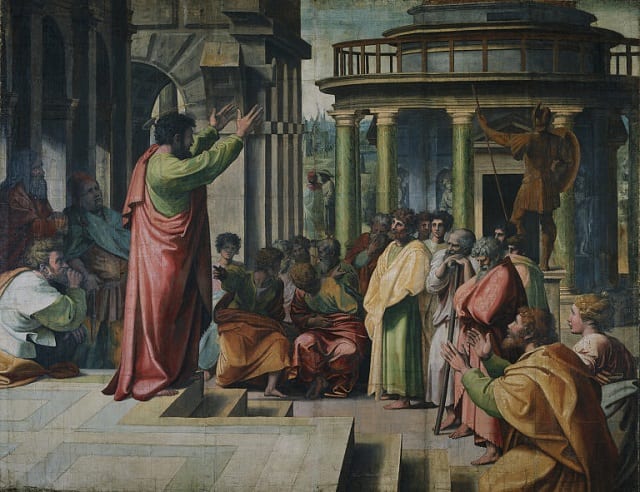Plus Further Related Exchanges with Aaron and a Few Others in an Atheist Combox

Aaron Adair is an atheist physicist, who wrote the book, The Star of Bethlehem: A Skeptical View (2013). He initially wrote me a cordial letter after seeing a few of my recent posts on that topic, and I responded in kind, at considerable length. But — sadly — it quickly descended to the usual anti-theist atheist insults. My reply below under an absolutely atrocious, abominable put-down post from him against me (or rather, a gross caricature of what I am and what I have argued), was posted underneath it at Jonathan Pearce’s blog, A Tippling Philosopher. Aaron’s words will be in blue.
*****
As Aaron alluded to, we had been engaging in private correspondence, which quickly went sour due to his relentless insults. It was perfectly cordial in the first round till Jonathan publicly reported that Aaron [not named but later verified] called one of my articles — behind my back as it were –, a bunch of “hot air”. Then it quickly went downhill after that (to my immense disappointment: but I should have known better). One gets a flavor of what happened privately, above: “he’s a poor researcher, searching for any tidbit that seems to favor his theories and blind to any contrary evidence.”
What else is new with anti-theist atheists? If even well-known Christian debaters and philosophers like William Lane Craig and Alvin Plantinga get the same treatment (they’re all idiots and blowhards, so we are endlessly reminded), who am I (a mere lowly, despised lay apologist) to think it would be any different and that respectful dialogue could actually be attained? Heaven help me from my hopeless idealism . . .
Whatever my merits or demerits, abilities or lack thereof, clueless idiot or not, at least I was willing to enter into a full-fledged point-by-point debate, with both sides comprehensively presented on my blog (and his — + this one — , if he wanted) but Aaron flatly refused. So instead we have him systematically caricaturing my side of the argument. Very impressive, but par for the usual course. Rather than a fair exchange of two sides, we have one side cynically caricaturing what the other argued, with massive misrepresentation: trashing supposedly lousy research and then exhibiting the same for one and all to see. It’s pathetic and pitiful: all the more so from an academic (a physicist).
If anyone wants to read how I actually argue the thing, see my nine articles on the star:
Timeline: Star of Bethlehem, Herod’s Death, & Jesus’ Birth (Chronology of Harmonious Data from History, Archaeology, the Bible, and Astronomy) [12-15-20]
Conjunctions, the Star of Bethlehem and Astronomy [National Catholic Register, 12-21-20]
Star of Bethlehem: Refuting Silly Atheist Objections [12-26-20]
Star of Bethlehem: More Silly Atheist “Objections” [12-29-20]
Astronomy, Exegesis and the Star of Bethlehem [National Catholic Register, 12-31-20]
Pearce’s Potshots #12: Supernatural Star of Bethlehem? (Biblical View of Astronomy, Laws of Nature, and the Natural World) [1-11-21]
Star of Bethlehem: Natural or Supernatural? [1-13-21]
Bible Commentaries & Matthew 2:9 (Star of Bethlehem) [1-13-21]
I ain’t gonna take on every misrepresentation and/or noncomprehension of my arguments presented above. It would be a complete waste of time. I’ve already dealt with all this. Jonathan blew it off, refused to discuss it, and so I presented it in a new paper yesterday, and added another just about biblical commentators and their views. Most atheists will simply believe their fellow atheist no matter what. There is little interest in actual dialogue. Aaron had none.
Fair-mindedness and giving someone even a minimal benefit of the doubt that they have honest, thought-out differences seem to be regarded around here and in virtually all atheist echo chamber venues, as quaint and naive remnants of a remote past. So I’ll just pick one thing where Aaron has made a mountain out of a molehill: the issue of what the Greek word hou means.
I explained to him what happened there, and it was an exceedingly minor point, but to no avail. I never called it a “noun.” I simply said that it was translated as “place” in English translations (which will be documented below). It’s true I modified this section, because if Aaron could misunderstand what I wrote this badly, chances are others could, as well. In modifying, I took the opportunity to make my argument presented there far stronger (which is what I absolutely love about challenges: however ill thought out, as this one was), and Aaron hasn’t touched it: being too caught up in his goal of making me look like an idiot allegedly way over my head, special pleader, and dishonest researcher.
Here is my fuller / modified argument from the word hou, in one of my replies to Jonathan that he, too, has decided not to reply to thus far (though he has done so with several of my articles in the past, and recent past). Make up your own minds (since Aaron has flat-out refused to discuss these things in the depth they deserve):
*****
Matthew 2:9 . . . the star which they had seen in the East went before them, till it came to rest over the place where the child was.
This passage refers only to the six-mile journey between Jerusalem and Bethlehem, and I have contended that all it means is that a bright star (I believe, Jupiter, in my scenario, backed up by astronomical charts of what was in the sky and where) was at the time in the direction of Bethlehem (that is, over it) from Jerusalem. It would not have “moved” in the perception of the wise men, over a journey of six miles, just as we could say we were traveling west, following the setting sun. It would always “go before us” as we traveled.
It’s phenomenological language, which is habitually used by Bible writers. We use it even to this day by referring to the “sun rising” or “sun going down” etc. Literally (as we understand) it is the earth rotating, thus making the sun appear to move. But we still refer to it in the non-literal way. So does the Bible, about a lot of things.
The other aspect is the clause “it came to rest over the place where the child was.” First of all, the text does not say that this means it shone specifically onto a “house.” Matthew 2:11 (i.e., two verses later) simply says they went “into a house”: not that the star was shining on it, identifying it. We have to get it straight: what exactly any given text under consideration actually asserts and does not assert.
Let’s examine the actual biblical text a little more closely. The Greek “adverb of place” in Matthew 2:9 is hou (Strong’s word #3757). In RSV hou is translated by “the place where” (in KJV, simply “where”). It applies to a wide range of meanings beyond something as specific as a house. In other passages in RSV it refers to a mountain (Mt 28:16), Nazareth (Lk 4:16), a village (Lk 24:28), the land of Midian (Acts 7:29), Puteoli (Pozzuoli): a sizeable city in Italy (Acts 28:14), and the vast wilderness that Moses and the Hebrews traveled through (Heb 3:9). Thus it can easily, plausibly refer to “Bethlehem” in Matthew 2:9.
In RSV (Mt 2:9), hou is translated by the italicized words: “it came to rest over the place where the child was.” So the question is: what does it mean by “place” in this instance? What is the star said to be “over”? And then I noted other uses of the same word, which referred to a variety of larger areas. The text does not specifically say that “it stood over a house.” Yet Jonathan (and many able and sincere, but in my opinion mistaken, Christian commentators) seem to think it does.
This is an important point because it goes to the issue of supernatural or natural. A “star” (whatever it is) shining a beam down on one house would be (I agree) supernatural; not any kind of “star” we know of in the natural world. But a star shining on an area; in the direction of an area (which a bright Jupiter was to Bethlehem in my scenario: at 68 degrees in the sky) can be a perfectly natural event.
Matthew 2:9 is similar to how we say in English: “where I was, I could see the conjunction very well.” “Where” obviously refers to a place. And one’s place is many things simultaneously. Thus, when I saw the “star of Bethlehem”-like conjunction in December [2020], I was in a field, near my house (in my neighborhood), in my town (Tecumseh), in my county (Lenawee), in my state (Michigan), and in my country (United States). This is my point about “place” in Matthew 2:9. It can mean larger areas, beyond just “house.” If the text doesn’t say specifically, “the star shone on the house” then we can’t say for sure that this is what the text meant.
I never claimed that hou was a “noun” in my original wording. I was noting that it was referring to place: as indeed it did in Matthew 2:9, since the translation of it in RSV is “the place where.” Therefore “place” is a translation of hou in this instance.
I have found 18 other English Bible translations of Matthew 2:9 that also have “the place where” (Weymouth, Moffatt, Confraternity, Knox, NEB, REB, NRSV, Lamsa, Amplified, Phillips, TEV, NIV, Jerusalem, Williams, Beck, NAB, Kleist & Lilly, and Goodspeed). In all these cases, they are translating hou: literally meaning “where” but at the same time implying place (which is the “where” referred to). The Living Bible (a very modern paraphrase) has “standing over Bethlehem”: which of course, bolsters my argument as well (because it didn’t say “house”).
All these things being understood, all the text in question plausibly meant is that the bright star was shining down on Bethlehem, just as we have all seen the moon or some bright star shining on a mountain in the distance or tall building or some other landmark. A man might see the light from the harvest moon romantically shining on his girlfriend or wife’s face. It need not necessarily mean that this is all they are shining on. It simply looks that way from our particular vantage-point.
All of this is in my opinion, more plausible and straightforward and in line with biblical thinking than positing a supernatural “star.” It’s true that many reputable and observant Christian biblical commentators exist who do argue for that interpretation, and I don’t disparage them. Theirs are honest efforts just as this paper is. Reasonable people can and do disagree. I can only present the reasons for why I hold to my opinion, and for why Jonathan’s assertions of a necessary or exclusively plausible supernatural nature of the star of Bethlehem are less reasonable and likely than my scenario.
***
Carstonio (henceforth in green) Any point of light in the sky that would have been capable of spotlighting a small area on the ground certainly wouldn’t have been a star or a planet – perhaps only a few hundred feet in the air. The originators of the nativity legend wouldn’t have made that kind of distinction, given the knowledge of cosmology at the time. Based on the text, the behavior sounds more like the Deluminator in the last Harry Potter novel.
Again, the text doesn’t specify a “small area” being illuminated, or even a larger one, as I have explained over and over. All the actual text says is “the star which they had seen in the East went before them, till it came to rest over the place where the child was” (Matthew 2:9, RSV). And as I have shown, all that has to mean, given the use of the word hou in the New Testament is: “the star stood over Bethlehem”: particularly from the vantage point of the journey south from Jerusalem to Bethlehem.
It had to be [in this scenario] in the direction of Bethlehem (south). In my scheme it (Jupiter) is that in December 2 BC: 68 degrees up in the sky too, according to the astronomical charts. That’s known; the only question is if it lines up with the date of Jesus’ birth, which is a whole different question, of course.
This business of “spotlighting a small area” is simply not in this text, and I think many people get the idea from 1) Christmas cards and other prevalent images of the Nativity, and 2) the passage in Luke regarding the angels and shepherds, where almost all Christian commentators (including myself) hold that the light is supernatural and what is called shekinah, or the light of “God’s [or angels’] glory.”
Geoff Benson (henceforth in brown)
“ them, till it came to rest over the place where the child was”
Two points. Firstly how could it ‘rest’? It is a very slow moving (our perception) celestial body so it could never just stop from the viewpoint of the Magi. They didn’t see it actually moving so they didn’t see it stop. Secondly, it’s several hundred million miles away. At any considered point it can’t be regarded as direction to any individual point. The Magi would have needed to move only a few yards and the indicated target would have been entirely different, even assuming it was sufficiently low on the horizon to give meaningful guidance. The very simple geometry problems are massive.
My broader point still holds – a light that behaved that way would have had to be in the troposphere.
Your presupposition as to how it supposedly behaved isn’t in the text, so it has no support.
The text says the star went before them, till it came to rest over the place where the child was. That’s a description of a light that’s moving in the sky at the traveling speed of the three men, independent of the stars, and that would require a fairly low height compared with celestial objects.
It is if it’s taken literally. I don’t take it absolutely literally, but rather, view it as one of many biblical examples of phenomenological language: the language of appearance.
Isn’t this an excellent example of why the ‘star’ should be regarded as supernatural, and not a natural phenomenon [?]
No, at least not in my opinion. But there are a lot of good Christians who think it’s supernatural. We have no problem allowing a diversity of explanations. The important thing was that it existed and was a sign to the wise men. All Christians fully agree on that, which is the essence of it, after all.
And plenty of other Christians don’t read the stories literally either. But some do and they demand that everyone else accept them as irrefutable fact. Because of that demand, the literal readings deserve to be scrutinized and challenged, or at least categorized as originating with legend.
I’m not demanding anything about the star (other than that it was an actual historical occurrence per my belief in the veracity of the Bible). Equally good Christians take all kinds of positions. I’m opposing Jonathan and Aaron’s “dogmatic supernaturalism” regarding the star.
*
Two quick things:
1. Since you translated hou as ‘place’, and ‘place’ is a noun, you therefore said hou is a noun. This is just basic transitive logic: if A=B, and B=C, then A=C. Please don’t tell me I misunderstood your argument when you clearly don’t understand your own.
2. I don’t have reason to go point-for-point because you literally just ignored the entirety of my article, not to mention my book on the subject. Why go into details when you don’t even know what the details of the argument are, while also showing you don’t know anything about the underlying text and need help with the most basic points?
Oh, so you are Aaron [I didn’t realize this at first, given the usual ridiculous nickname: a thing I have loathed online since 1996], and now you’ve worked up the gumption to actually interact with my specific arguments: here with all your buddies to support and cheerlead, while I’m all by myself? That’s cute.
I didn’t translate anything, so your premise is wrong. I don’t know Greek. 19 Bible translations (produced by many hundreds of Greek linguists) decided to translate the clause in Matthew 2:9 as “the place where” [Jesus was]. Go take it up with them. I merely reported what they did.
I have explained its relationship (it’s described by grammarians as an “adverb of place” after all) to what is indeed a noun: “place” (to no avail). Both you and Jonathan refused to address this. It can function very much like a noun in English usage, as I have noted recently. We say, for example, “where we were, was an excellent vantage-point to view the conjunction.” It obviously inexorably implies “place” (noun): which is why some Bible translations (e.g., KJV) simply use “where” for hou at Matthew 2:9, and additionally why 19 that I have found render it “the place where.”
So all this hogwash about me saying hou was a noun, which I never did, and ignoring this aspect which I have now explained more than once, is obscurantism and obfuscation; sophistry. It’s yet another case where atheists can’t admit that a Christian can be right about anything.
What’s actually relevant is what “place” in this sense refers to in biblical koine Greek, and as I have shown, it refers to larger areas: not just one house, as you and Jonathan appear to think.
Yes, I will ignore most of your idiotic “reply” to me because it’s aimed at things I don’t believe in the first place. You’ve forfeited the opportunity to have a serious, constructive discussion with a Christian about this (as your first letter seemed to be) by acting like a pompous ass and academic snob. That was your choice. I’m simply clarifying a few key things here since you have decided to attack me all the more and try to make me look like a pretentious fool.
It can function like a noun? Congrats, you’re just making things up. Adverbs are not nouns, and they don’t function as nouns. As for its relationship, uh all words have relationships! Don’t try to make a linguistic argument, it’s just embarrassing.
Please also note, I never said the translation ‘the place where’ was wrong. Not once. What I did say was that you said hou meant place, which it does not. Everything else you have tried to come up with is the same sort of hot air I complained about: sound and fury signifying nothing.
Additionally, I never said hou only refers to small areas or just houses. Not once. Instead, what did I say? Look up, and you’ll find that I said the meaning of such general words get their meaning from context. And you ignored every other word in the verse. You are literally taking the word out of context, and somehow say that proves its meaning in context.
Try addressing my actual arguments. You’ll learn a thing of two.
Hou is translated as “the place where” in 19 Bible translations. Take it up with them. I might get some finer grammatical points wrong (I freely confess) — I hated grammar in school, though I got A’s in English and wound up as an author and writer — , but this basic fact stands. You can’t (and don’t, above) deny that the word was rendered “the place where” by these many hundreds of linguists.
I did nothing wrong in noting that fact. The “sound and fury signifying nothing” is all from your end.
Looks like you’re reading skills are failing you, as are grammar skills. I never said the translation ‘the place where’ was wrong. Not on[c]e. I said that you were wrong when you said hou meant place. You can’t even begin to address my actual arguments if you don’t even know what I’ve said. Actually address what’s there, not the phantasm you imagine.
I know that feeling well! I’m not interested any longer in any discussion with you. When you first wrote, I was very interested. But I lose all interest once someone takes a hostile stance and starts misrepresenting my views. It’s only because you did the latter here that I replied, since I have a right to defend myself (and Jonathan is nice enough to not ban me like Seidensticker does).
But I’ve done about all I can do here. There’s very little genuine dialogue between Christians and atheists anywhere.
In other words, you can’t address any point I’ve made. I’ve already shown that your arguments are fundamentally flawed, you don’t even show an awareness of what my arguments are, and you copy-paste over and over what is not even relevant and misrepresent what anyone has said, all because you were shown to be wrong even on trivial basics.
If you want dialogue, actually address the arguments. If you can’t, then move on to something you can defend. If you don’t know Greek, don’t try declaring you know what the Greek means. If you don’t know astronomy, don’t make astronomical arguments. If you don’t know much of anything about the theories of the Star of Bethlehem, don’t argue with an expert on the subject as if you know anything and then cry all over the Internet that your feelings were hurt.
And most importantly, don’t lie about things. That’ll really get you in trouble.
And don’t be a pompous ass and an academic snob. It gives a bad name to atheists, who already are widely perceived among Christians as irrationally angry, relentlessly hostile and insulting, and impossible to interact with in any constructive manner. If you want to foster that perception, knock yourself out.
This could have been a great and enjoyable dialogue. There was no need to descend to rank insult as you have done. It impresses no one except atheists who want to push the notion that all Christians are idiots and anti-science, anti-reason. I’m not a liar and I’m not an idiot (agree or disagree with me on whatever). I don’t think all atheists are immoral people who will automatically go to hell (never have). I’ve had great dialogues with several atheists (one of which is my very favorite among my 1000+ posted online).
I haven’t pretended that I know more about anything (be it astronomy or Greek) than I do. I’m citing others who do know about those things. I simply have an honest disagreement on this issue with you.
*
Matt Brooker (Syncretocrat)
These attempts to make Bible stories fit with scientific fact strike me as odd for two reasons:
1) If you already accept miracles, what’s implausible about god creating a moving light in the sky that looks like a star? If critics don’t like miracles, just accuse them of “anti-supernatural bias.” That seems more congruent with theism than trying to shoehorn Bible stories into scientific fact.
2) Doesn’t the whole enterprise of making the Bible fit with science show that science is the greater authority?
No. It shows that Christians respect science just as everyone else does, and that we take it into consideration in biblical exegesis, which has changed as a result of scientific discovery. In one of my papers on the star I noted five areas where this has happened.
We believe in scientific knowledge and discovery and also theological knowledge (from revelation and reason). Both things are true. Many Christians were wrong about heliocentrism in the 16th century, but so also were Copernicus and Galileo (both Catholics, of course), since the sun ain’t the center of the universe, either. And Galileo and Kepler were neck-deep into astrology, and Newton into occultism and alchemy. We all learn stuff all the time.
*
eric
But how did you decide that that phenomena was not a miracle? You’re drawing from RSV Matthew 2. Okay, in that same section, in verse 13, an angel appears to Joseph in a dream. Was that also a natural phenomenon?
If not, how did you come to the conclusion that 2:9 does not describe a miracle, but 2:13 does? It seems quite arbitrary.
One has to look at each case. There are obviously lots of miracles in the Bible, and I believe them, as an orthodox Catholic who believes in biblical inspiration. I happen to think (for many reasons that I detail in my papers) that it’s more plausible to hold that the star of Bethlehem was a natural occurrence (actually a combination of two different celestial events). Likewise, natural occurrences coincided with Jesus’ crucifixion (an eclipse and an earthquake: both also able to be verified from scientific and literary records).
Many Christian commentators (and most before the 19th century, as Aaron likes to point out) have thought the star was supernatural, too. We have a diversity of opinion on the matter, but Jonathan and Aaron want to be dogmatic (how ironic, huh?) and act as if only the supernatural version can be held by any rational, sentient being. It’s poppycock.
While “all miracles” or “no miracles” might be dogmatic, having a consistent method for deciding which is which is, in my opinion, not. While personal reasoning may be fine for individual believers (like you), once someone decides they want to try and convince others, having a system that an outsider like me cannot apply independently means your system is not convincing. It may be valid, but without being able to communicate it, I cannot determine that.
But let’s leave this aside. I’d rather we continued to discuss your Jupiter explanation above, than spend more time on this.
I think most cases are obvious. The star is a bit more subtle than most (which is why it’s really fascinating for a Bible student and apologist like me to ponder, because it’s not hard and fast). I have provided many reasons for why I think the natural explanation is more plausible. It would have been fun to discuss and debate those point-by-point with Aaron, if he had remained congenial, but he decided not to.
Most biblical miracles can hardly be deemed as natural events (though many have tried: particularly more theologically liberal commentators). One famous one is the ridiculous slop about the “Reed Sea” that was only a few inches deep. Moses “parted” that and the Hebrews slogged through it. The standard joke about this is that the real miracle would have been the Egyptian army drowning in two inches of water. LOL
Most biblical miracles (assuming, of course, that they actually happened as reported) could only be miraculous. Jesus raised the dead, healed the sick, raised Himself, fed the 4000 and 5000 by multiplying available food, walked on water, stilled the storm, ascended to heaven. No one could say these were “natural” events. Elijah went to heaven in a fiery chariot. Manna came down from heaven, donkeys talked, weird plagues came upon Egypt. People talked in languages they themselves didn’t know, on the day of Pentecost. God became a man. Baptism regenerates us and does all sorts of wonderful things. Wicked sinners can be redeemed and exhibit radically changed lives. All miraculous . . .
One thing that can be natural was Jonah and the whale. It’s now been proven that men could be swallowed like that and actually survive (actual cases). If it wasn’t miraculous for them then it likely wasn’t for Jonah, either.
I noted in one of my papers that when I wrote about Joshua and the “sun standing still” I took a miraculous view, but not of the sun being still (which would mean, of course, that the earth stopped rotating). Rather, my view was that God caused a massive change in the perception of the people, in how they saw the sun. Some explanations try to take a more phenomenological-type view, as I have with the star. I didn’t buy it. It wasn’t convincing to me at all.
But back to the star: my scientific / natural view indeed can be examined independently, precisely because it involves known astronomical events in particular places. That’s what’s so fun about it. I think its a great argument for the Bible and the miraculous birth of Jesus. It’s one of those things like the Shroud of Turin and the image of Mary Guadalupe and the miracle of the sun at Fatima (witnessed by 70,000) and incorrupt bodies of saints that have all sorts of fascinating aspects to them (and can be scrutinized through scientific techniques). It reminds me of the confirming evidences of biblical archaeology: except here it’s astronomy that confirms biblical accounts.
All of this works to convince the occasional atheist precisely because it can be verified and examined in a way that a supernatural explanation cannot. Atheists can simply dismiss all miracles out of hand, and they do all the time (even though it’s irrational to do so, I would say, since it’s very difficult to prove universal negatives).
*
[RSV] Matthew 2:9 . . . the star which they had seen in the East went before them, till it came to rest over the place where the child was.
[DA] This passage refers only to the six-mile journey between Jerusalem and Bethlehem, and I have contended that all it means is that a bright star (I believe, Jupiter, in my scenario, backed up by astronomical charts of what was in the sky and where) was at the time in the direction of Bethlehem (that is, over it) from Jerusalem. It would not have “moved” in the perception of the wise men, over a journey of six miles, just as we could say we were traveling west, following the setting sun. It would always “go before us” as we traveled.
Hello David. I hope you will answer my question.
So the Magi are in Jerusalem. Jupiter is in the southern part of the sky – mostly direct south or perhaps SSW of them. They travel the 5 or so miles in the direction of Jupiter and arrive at Bethlehem. Jupiter hasn’t moved, the time is too short. So it’s still in the southern sky to the Magi.
How is this “came to rest”? The ‘star’ looks exactly the same, and is in the exact same place, it was when they were in Jerusalem. Nothing about Jupiter can indicate to them that they’ve arrived at their destination, because to them, it’s exactly the same as it was one city back. So how is your scenario consistent with the passage?
Thanks for the question. I would reply in two ways: it’s phenomenological language: which is non-literal, but in this case describes what some commentators on the question would say is the retrograde motion or “stationary point” of planets (in this instance, Jupiter).
Thank you for your answer. But I do not understand how that answers my question. You said: “It would not have “moved” in the perception of the wise men.”
Now you’re discussing retrograde motion. Did they see retrograde motion? Is that what you are saying “come to rest” means – the observation of the planet going (very…very…slowly…) west instead of east?
How is this consistent with your original claim, above, that they didn’t see it move?
They wouldn’t see any motion to speak of if Jupiter was at a stationary point and in the sky to the south over Bethlehem, approached from Jerusalem.
Okay, so I’m sorry if I’m being dense about this, but if the Magi didn’t see it move, how is your post about retrograde motion relevant to the verse’s statement that the star ‘came to rest?’
It wouldn’t move much on the way from Jerusalem to Bethlehem. A camel normally travels about three miles an hour, so it would have taken them about two hours. That’s roughly the entire time the Bible refers to them (in non-literal language, I believe) following a star. In the language of appearance (remember, this is my interpretation: non-literal language employed), it “went before them” not in perceived motion, but because it was always ahead of them on the way.
To say, then, that the star “came to rest over the place” is to observe that they didn’t see it moving much over Bethlehem once they arrived there. I’m not an astronomer, so I can only cite other people who know more about these aspects.
The EarthSky site (“Jupiter ends retrograde on July 10-11”) notes regarding Jupiter’s stationary point in July 10-11, 2018:
Tonight – July 10-11, 2018 – the planet Jupiter is poised in front of the stars of the zodiac. It’s now moving neither east nor west against the star background, but will soon resume its usual eastward course. In other words, Jupiter is stationary on July 11 at 04:00 UTC. In United States time zones, Jupiter reaches its stationary point on July 11 at 12 midnight EDT, and on July 10 at 11 p.m. CDT, 10 p.m. MDT, 9 p.m. PDT, 8 p.m. Alaskan Time and 6 p.m. Hawaiian time.
So in my scenario, this was the case in Bethlehem when the Magi arrived. This is what would have looked to them like “[coming] to rest over” Bethlehem. The astronomical charts show this for one of the days in December, 2 BC. That’s my proposed date for their visit. Of course it could be wrong and is only speculation, but Jupiter would behave in this way then.
The Wikipedia article, “Apparent retrograde motion” provides another example:
Galileo’s drawings show that he first observed Neptune on December 28, 1612, and again on January 27, 1613. On both occasions, Galileo mistook Neptune for a fixed star when it appeared very close—in conjunction—to Jupiter in the night sky, hence, he is not credited with Neptune’s discovery. During the period of his first observation in December 1612, Neptune was stationary in the sky because it had just turned retrograde that very day. Since Neptune was only beginning its yearly retrograde cycle, the motion of the planet was far too slight to be detected with Galileo’s small telescope.
That’s lack of motion, and that is what I and others suggest was happening with Jupiter over Bethlehem when the wise men visited, thus bringing about the Bible’s statement that it “came to rest over the place where the child was” (Mt 2:9, RSV). Thus, the language of appearance can explain both clauses: the one just mentioned and also “went before them”, and can be harmonized with celestial events in the way I have explained.
If the wise men hit the right day, Jupiter would have appeared to be stationary, just as Neptune was for Galileo in December 1612 “because it had just turned retrograde that very day.” I didn’t make this stuff up. I had never heard about it till last month when I saw the famous Larson video on the star. But it has fascinated me ever since and it’s my theory unless and until I see something more plausible.
In the Christian view, God in His providence could have again arranged that the wise men, exercising their own free will, arrived at just the right time when the bright Jupiter appeared to be a sign above Jerusalem, for this king they believed was indicated by what they saw in Persia or Babylon (both due east).
Commentator Peter Pett stated that Jupiter “was actually stationary on December 25, interestingly enough, during Hanukkah, the season for giving presents.” That was in 2 BC. Note again that I am not saying this is when Jesus was born, but rather, when He was a year old. Just as the trek to Bethlehem may have taken only 18 or so minutes, likewise, their visit to Jesus may have been very short, for all we know. The overall passage may imply that they left quickly, to avoid a return visit to Herod: going back another way: which I think was either the coastal route west and north or straight through the desert to the east.
But say they were only there two hours. They would have seen very little motion of Jupiter in that time because of its being stationary, and so again, it would be perfectly harmonious with the clause “came to rest over the place where the child was”. Phenomenological language describing natural events all the way . . . That’s my theory.
Why didn’t they stop in Jerusalem? A 20-120 minute travel time means Jupiter would’ve also been in the ‘pause day’ in it’s precession when they were in Jerusalem.
Given that the pause-and-reverse window is relatively long (a day or so), how did they know the “at rest” moment was in Bethlehem, rather than an hour or two earlier in Jerusalem or an hour or two or more down the road?
Well, I did find some good material that I added somewhere in this mammoth thread: about ancient knowledge of retrograde motion of planets. [added to my longest paper on the star]
My view is that they saw a conjunction while in Persia or Babylon that led them (by means of their astronomy / astrology) to believe a king was to be born in Jerusalem or somewhere in Israel, at any rate. They got to Jerusalem by the usual known and well-traveled routes (Royal Road / King’s Highway / Silk Road through the Fertile Crescent around the desert) and inquired for more specific information to find Jesus (Mt 2:1-2). Herod summoned them and they learned about the messianic prophecy of Micah 5:2 from his priests. So now they had general astronomical guidance and more specific prophetic indication.
That’s more than enough to know that the blessed event was in Bethlehem, not in Jerusalem. Bethlehem was, moreover, the city of David, so if one is looking for more “kingly” significance, there you go. And the Old Testament presented David as a prototype of the Messiah. So that’s now two scriptural pointers to Bethlehem.
The star (not the bright conjunction they saw in the east but now Jupiter alone) was in that direction, but they already knew by this point that this was the destination anyway. Once they got there it “came to rest” and they recognized that this was retrograde motion and Jupiter’s stationary point, because we know (as I showed earlier) that the ancients (particularly the Babylonians) knew about these things, which would mean that they, as astronomers and sky-watchers, very likely did. Thus, they may have passed on the highly technical information about retrograde motion and Jupiter’s stationary point in common parlance as “came to rest.”
When they were in Bethlehem, the fact that Jupiter had reached its stationary point and appeared to be 1) over Bethlehem and 2) not moving much or at all, would have been further astronomical verification to them, so, accordingly, “they rejoiced exceedingly with great joy” (Mt 2:10).
The holy family itself could have been found by the usual means. Everyone in a small town knows everyone else. One simply asks around. Certainly, if Jesus was a year-old at this time, as I believe, people in Bethlehem (at least someone there) would have been familiar with the story of Luke 2 and His Nativity and would know where He was living. This ain’t rocket science.
The star didn’t guide them to that extent (right to the house) because it didn’t shine down on the house. That’s not in the text, and is simply widespread “Christmas myth” (and often atheist skeptical anti-Christmas myth as well). It was just sitting there up above Bethlehem, stationary, and so they took that as a sign, along with the messianic prophecy.
*
I also note: in my first emails to you I never insulted you. I said your arguments were bad in my second message to you. If you can’t distance yourself from your arguments, then that is a failure on your part. I’ve had friends tell me I’ve made bad arguments before, and I didn’t take it as a personal affront. Moreover, I even told you what you could do to have a good argument. I went out of my way to let you know how you could convince me. But instead, your just went and figuratively flipped the table, and now are looking for more places to vent.
Maybe, just maybe, you are taking this stuff that you don’t even know that well all too personally. I’d either drop it, or learn the underlying material better than folks like me. Flailing about because everyone here finds your arguments to be poor ain’t doing you or your apologetic mission any favors.
You know full well that you weren’t just disagreeing with what you think are bad arguments. You went (starting in your second letter; the first was basically just a few questions) right to me being supposedly deliberately dishonest and an absolutely incompetent researcher.
You made a mountain out of a molehill with a completely minor, “footnote”-like citation I made of [19th century Methodist commentator Joseph] Benson. I explained it and you said in your second reply, “That looks dishonest.” Then you continued (and upped) the rank insults with your post today:
He told me it was a simple mistake, but if so then it shows he’s a poor researcher, searching for any tidbit that seems to favor his theories and blind to any contrary evidence. Sounds like an apologist to me.
Somehow you think that constructive dialogue can occur with an opinion that rock-bottom low, taken of the opponent. It’s not possible, and I have no interest in a mud pie fight.
You’ve engaged in relentless condescension and snobbery. You haven’t overthrown my view at all. All you’ve done is mock and ridicule it and shown your abominable attitude and pomposity. You made it clear more than once that you had absolutely no interest in a point-by-point dialogue (which I am always interested in, if someone wants to be serious), and ridiculed my analogical and “background” arguments as utterly irrelevant: only fit to be ignored. You’ve yet to even fully grasp my position. If you had, you wouldn’t show such a great interest in caricaturing it for the crowd here: knowing they will sop up whatever you say, and that I’ll never receive fair treatment here.
I am grateful to Jonathan, though, for allowing me to at least respond to some extent underneath your atrocious hit-piece and to present my side of it. There were at least a few good smaller discussions. People can think what they will of me. I’ve long since stopped caring about whether the sub-group of anti-theist atheists think I am “honest” or not. I know I am, so it’s of no relevance at all to me if some snob like you decides in one day that I am both utterly incompetent in my very field (Christian apologetics) and dishonest. It means less than nothing. I have defended myself, yes, as most people would. But I know the truth about myself.
Anyone who is fair-minded and attempts even rudimentary objectivity can look at what I’ve written and clarified here and make up their own minds.
*
Early artistic depictions of the Nativity show the star as a comet, and it’s possible that the later depictions arose from misunderstanding when translating. I don’t know who came up with this theory, but it’s been proposed that the celestial phenomenon might have been Halley’s Comet. That would mean either that memories of the comet became attached to the Jesus story, or that he was some years older than claimed in the Gospels. None of that is meant to imply that the story is anything more than legend.
Which of course is one of the natural explanations. Jonathan and Aaron opt for the supernatural explanation and mock the alternatives. I don’t do that. I say that reasonable, able people hold both positions. I hold to the natural explanation and give many reasons for why I do.
We don’t even know if there was a star, and the word of whoever wrote that Gospel isn’t sufficient proof. Even if there were a star, and the purported event conformed to what we know of celestial mechanics, attributing the event to a sentient entity like a deity would make it a directed event rather than a natural phenomenon. A deity working through physical laws rather than in violation of them would still constitute another element in the causal chain.
Not necessarily. God in His providence could and would have (in this scenario) simply planned for the supernatural event (the virgin birth and incarnation of Jesus) to correspond with totally natural, not miraculous at all “sign events” (two manifestations of the star of Bethlehem), just as the crucifixion aligned with two natural events: an eclipse and an earthquake.
***
Photo credit: OpenClipart-Vectors (1-31-17) [Pixabay / Pixabay License]
***


























Malcolm Muggeridge Quotations
*
*
St. Teresa of Calcutta (Mother Teresa)
*
*
*
*
*
Malcolm Muggeridge & Mother Teresa: A Blessed, Fruitful Meeting [9-6-16]
*
The Holy Collaboration of Mother Teresa and Malcom Muggeridge [National Catholic Register, 6-20-18]
*
***
*
(originally compiled and uploaded in 1997)
*
Photo credit: From the Amazon page for the book, Malcolm Muggeridge: A Biography, by Gregory Wolfe (Intercollegiate Studies Inst; Paperback edition: April 1, 2003).
***
Summary: Malcolm Muggeridge (1903-1990 was a journalist, satirist, social commentator, author & great Christian & Catholic thinker. I collected examples of some of his most brilliant observations.
***